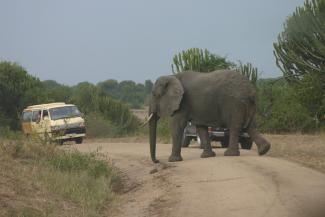Comment
German companies take a level-headed stance

“In terms of perception, Ebola is a lost cause,” an employee of one of our corporate members said recently. “If you say you are staying in the region, you’ll spark a backlash from people who consider Ebola a public health hazard in Europe. And if you say you are leaving, others will accuse you of abandoning the region.”
The economic effects of the Ebola catastrophe are immense. Businesses are closed, trade has come to a standstill, daily provisions are becoming scarce. The outbreak of the virus has set the three most heavily affected countries – Guinea, Liberia and Sierra Leone – back years. For fear of contagion, people are no longer going to work, borders are closed, and ships stay away from ports.
The downward spiral is reinforced as many international companies are backing away. People have lost their jobs, suppliers have lost their customers, and consumers cannot rely on the retail shops they are used to. Companies from various countries, including the UK, China and the USA, have shut down operations. Some German companies have also shelved projects in the affected countries and neighbouring ones. Employees are transferred temporarily to Germany. Conferences and meetings with African business partners are held in London instead of Freetown, for example, not only to protect employees, but also because public order has broken down. For a while, hardly a flight took off from the affected countries, and domestic travel there remains difficult.
The numbers are alarming: More than 8,000 people have died from Ebola so far, and many more will suffer the disease’s economic consequences. The reason, however, is not that some foreign companies have reduced their operations. On the contrary, most have reacted in a far less alarmist manner than the general public. “Ebola?” a German businessman quipped in Kinshasa in September. “Ebola is no more dangerous than road traffic in most African countries.” Businesspeople, some of whom have decades of experience in Africa, have a more nuanced view of the continent than the public at large. They know that Botswana is as many miles away from Ebola-stricken Sierra Leone as New York is from Lisbon. And they can tell the difference between real risks and hysteria. Some firms’ decision to leave the blighted countries makes sense from a business perspective. What does not make sense is the hysterical reaction from some segments of the general public. It is actually quite destructive. In one stroke, a continent, which is as large as Europe, the USA and China together, has been stigmatised and shunned. There were two Ebola cases in Texas. We are not aware of anyone cancelling a trip to Paraguay for that reason.
In Kenya alone, some 600,000 people work in tourism, which is the country’s second-largest industry after agriculture. Thousands have lost their jobs in recent months. In Tanzania, Botswana and even in South Africa, the situation is similar. Hotels are empty, restaurants closed. Tourists have cancelled trips to Africa, or are not booking any. Travel agents have waived cancellation fees for countries where Ebola cases were merely suspected. Many tourism operators are no longer offering trips to Africa. According to economists, safari bookings are down by 70 % in east Africa.
Many western people are plainly abandoning the region and even the entire continent. That does not apply primarily to foreign investors however. We hope the general public will return to its senses and once again provide jobs on Africa’s beaches and in its national parks.
Christoph Kannengießer is the chief executive of the Afrika-Verein, an association of German companies with operations in the continent.
Carla Nickel is the spokesperson of the Afrika-Verein.
nickel@afrikaverein.de







